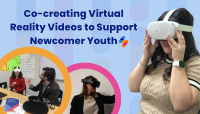Resources
Our multimedia resource library features content developed by both Switchboard and the larger resettlement community. You can browse the library by resource type, topic, population group, language, or publication year, or by using keywords through our search bar.
The external resources listed in this library represent the views and opinions of their original authors and do not necessarily represent the views or opinions of Switchboard.
Refine Results
FIRST PUBLISHED
RESOURCE TYPE
TOPIC
TARGET AUDIENCE
PUBLISHED BY
POPULATION
LANGUAGE
PUBLISHED BY:
This blog post describes a training and technical assistance (TTA) experience with the International Rescue Committee’s (IRC) Sacramento office, in which the Emerging Technology team at Switchboard collaborated with service providers, a local high school, and Afghan newcomer youth. Using design thinking and the co-creative process, they filmed a 360 immersive video to support the […]
PUBLISHED BY:
There is strong evidence that therapeutic strategies grounded in cognitive behavioral therapy (CBT) reduce mental health symptoms among unaccompanied refugee minors (URMs). ▪ Three systematic reviews, three scoping reviews, and five suggestive studies highlight the reduction of post-traumatic stress disorder (PTSD) and trauma-related symptoms and other forms of mental health distress when interventions are grounded […]
PUBLISHED BY:
As refugee housing providers, we understand the challenges newcomers face in finding and retaining stable housing. Navigating maintenance, budgeting for repairs, communicating with landlords, and accessing local resources can all be overwhelming. This guide aims to support both newcomers and their service providers by providing guidance on home maintenance for successful integration. Note: while the […]
PUBLISHED BY:
Newcomers may experience multiple issues accessing health care, including transportation, interpretation, competing demands, insurance, and barriers to follow-up care. While these issues are often systemic and rooted in inequities, and there are no perfect solutions, there are several ways service providers can support clients in overcoming barriers and advocating for their health. This guide, created […]
PUBLISHED BY:
There is strong evidence that therapeutic strategies grounded in cognitive behavioral therapy (CBT) reduce mental health symptoms among unaccompanied refugee minors (URMs). ▪ Three systematic reviews, three scoping reviews, and five suggestive studies highlight the reduction of post-traumatic stress disorder (PTSD) and trauma-related symptoms and other forms of mental health distress when interventions are grounded […]
PUBLISHED BY:
Refugee service providers play important roles in supporting newcomer clients’ safety and wellness. This includes being knowledgeable about mandatory reporting of abuse and neglect of children and vulnerable adults. This information guide explains what mandatory reporting entails—providing guidelines on who is considered a mandated reporter and how to make a mandated report. Because bias, cultural […]





